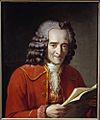Age of Enlightenment facts for kids
The Age of Enlightenment was an 18th century cultural movement in Europe. It was most popular in France, where its leaders included philosophers like Voltaire and Denis Diderot. Diderot helped spread the Enlightenment's ideas by writing the Encyclopédie, the first big encyclopedia that was available to everyone. The Enlightenment grew partly out of the earlier scientific revolution and the ideas of René Descartes.
Contents
Enlightenment ideas
The Enlightenment's most important idea was that all people can reason and think for themselves. Because of this, people should not automatically believe what an authority says. People do not even have to believe what churches teach or what priests say. This was a very new idea at the time.
Another important idea was that a society is best when everyone works together to create it. Even people with very little power or money should have the same rights as the rich and powerful to help create the society they live in. The nobility should not have special rights or privileges any more.
These were very new ideas at the time. They were also dangerous thoughts for the people in power. Many Enlightenment philosophers were put in prison or were forced to leave their home countries.
Effects
Many of the Founding Fathers of the United States believed the Enlightenment's ideas. For example, the idea that a government's job is to benefit all of a country's people not just the people in power was very important to them. They made this idea about a government "for the people" one of the most important parts of the new United States Constitution and the new American government they created.
The Enlightenment's ideas were also important to the people who fought in the French Revolution of 1789.
In some countries, kings and queens took some of the Enlightenment's ideas and made changes to their governments. However, they still kept power for themselves. These kings and queens were called "enlightened despots." Examples include Catherine the Great of Russia, Frederick the Great of Prussia, and Gustav III of Sweden.
During the Age of Enlightenment, as more and more people began to use reason, some began to disagree with the idea that God created the world. This caused conflicts - and, later, war.
Many ideas that are important today were created during the Enlightenment. Examples of these ideas include:
- Freedom, democracy, and reason should be the most important things in a society.
- Everybody in a society should have the same rights. Every government should have a contract which promises that people will have these rights.
- People should solve problems with rationalism and the scientific method, instead of looking for answers from religion
- Writers and philosophers should be free to look for the truth, even if they disagreed with the ideas of people in power such as aristocracy.
- Nobody should have to follow a certain religion. There should be freedom of religion, and people should accept others who follow different religions.
The Enlightenment's ideas about thinking with reason, having personal freedoms, and not having to follow the Catholic Church were important in creating capitalism and socialism.
Important Enlightenment figures
Important people in the Enlightenment came from many different countries and shared ideas in many different ways. Some of the best-known Enlightenment figures, organized by home country, are:
English
- John Locke (1632-1704): An English philosopher known as the Father of Modern Empiricism and the Father of Liberalism. His ideas were very important to Thomas Jefferson and The Founding Fathers when they wrote the United States Declaration of Independence. Locke's ideas about people's rights to "life, liberty, and the pursuit of happiness" were especially important, and appear in the Declaration of Independence.
- Thomas Paine (1737–1809): A writer, Deist, radical republican, and polemicist. He is most famous for writing a pamphlet called Common Sense, which said that England should not be allowed to control the colonies in America. Paine also wrote The Age of Reason, a criticism of the Bible, and The Rights of Man, which defended the French Revolution.
French
- Voltaire (born François-Marie Arouet) (1694-1778): A philosopher, writer, playwright, and Deist. He argued with the Catholic Church and the French government. Because of this, he was put in prison and exiled from France. He wrote many different books about philosophy, plays, and histories. His ideas were important in the French Revolution. Many people considered the 18th century to be le siècle de Voltaire (the "Century of Voltaire").
- Jean-Jacques Rousseau (1712-1778): A Swiss-born French philosopher, writer, and teacher. His criticisms of the French State were some of the most powerful of his time. In his book Emile, or On Education, he wrote about many of his opinions on education. He is also a figure of the Counter-Enlightenment.
- Baron de Montesquieu (1689-1755): A political thinker. He is famous his writings about the separation of powers. Today, this idea is very common and is a part of many constitutions all over the world.
- Denis Diderot (1713–1784): He wrote the Encyclopédie, which included 28 different books. In these books, he wrote about all different kinds of learning.
American
- Thomas Jefferson (1743-1826): A statesman, political philosopher, and Deist. He was a Patriot, fighting against England, during the American Revolution. He helped write the United States Declaration of Independence (1776) and the United States Constitution (1787).
- Benjamin Franklin (1706-1790): A statesman, author, scientist, and poet. He was also a Patriot during the American Revolution and helped write the Declaration of Independence and the Constitution. Franklin was the first person to understand lightning, and worked as a civil servant in Philadelphia.
German
- Immanuel Kant (1724-1804): A Prussian (German) philosopher, writer, and physicist. He was one of the most important people of the German Enlightenment. Between 1781 and 1790, Kant wrote three important books in the history of philosophy: Critique of Pure Reason, Critique of Practical Reason, and Critique of Judgement.
- Gottfried Leibniz (1646-1716): A philosopher and mathematician who created calculus. He was another leader of the German Enlightenment.
- Christian Wolff (1679–1754): A philosopher who continued Leibniz's work.
Scottish
- David Hume (1711–1776): A Scottish historian, philosopher, and economist. His ideas were important to Immanuel Kant and Adam Smith.
- Adam Smith (1723–1790): An economist and philosopher. He wrote The Wealth of Nations. In this famous book, he argued that wealth was not money; instead, it came from capital and labour. He is sometimes thought to have created the laissez-faire economic theory. His books brought many changes to the Western world.
Swedish
- Emanuel Swedenborg (1688–1772): A natural philosopher and theologian who tried to figure out how the soul worked in the body.
Images for kids
-
Reading of Voltaire's tragedy of the Orphan of China in the salon of Marie Thérèse Rodet Geoffrin in 1755, by Lemonnier, c. 1812.
-
German philosopher Immanuel Kant
-
The French philosopher Voltaire argued for religious tolerance, saying that "It does not require great art, or magnificently trained eloquence, to prove that Christians should tolerate each other. I, however, am going further: I say that we should regard all men as our brothers. What? The Turk my brother? The Chinaman my brother? The Jew? The Siam? Yes, without doubt; are we not all children of the same father and creatures of the same God?"
-
Europe at the beginning of the War of the Spanish Succession, 1700
-
One leader of the Scottish Enlightenment was Adam Smith, the father of modern economic science
-
John Trumbull's Declaration of Independence imagines the drafting committee presenting its work to the Congress
-
Statue of Cesare Beccaria, widely considered one of the greatest thinkers of the Age of Enlightenment.
-
Empress Elizabeth visits Russian scientist Mikhail Lomonosov.
-
Italian Jesuit priest Matteo Ricci worked with several Chinese elites, such as Xu Guangqi, in translating Euclid's Elements into Chinese.
-
Jean-François Champollion, considered the founder of Egyptology
-
A medal minted during the reign of Joseph II, Holy Roman Emperor, commemorating his grant of religious liberty to Jews and Protestants in Hungary—another important reform of Joseph II was the abolition of serfdom.
-
German explorer Alexander von Humboldt showed his disgust for slavery and often criticized the colonial policies—he always acted out of a deeply humanistic conviction, borne by the ideas of the Enlightenment.
-
French philosopher Pierre Bayle
-
Denis Diderot is best known as the editor of the Encyclopédie
-
Georges Buffon is best remembered for his Histoire naturelle, a 44 volume encyclopedia describing everything known about the natural world
-
First page of the Encyclopédie, published between 1751 and 1766
-
A portrait of Bernard de Fontenelle
-
Louis XIV visiting the Académie des sciences in 1671: "It is widely accepted that 'modern science' arose in the Europe of the 17th century, introducing a new understanding of the natural world"—Peter Barrett
-
Antoine Lavoisier conducting an experiment related to combustion generated by amplified sun light
See also
 In Spanish: Ilustración para niños
In Spanish: Ilustración para niños





























